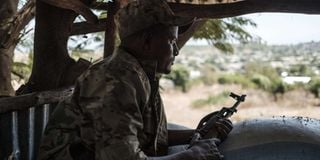Abiy says TPLF crackdown was necessary, offers dialogue with “legal” parties

A member of the Amhara Special Forces keeps guard at the 5th Battalion of the Northern Command of the Ethiopian Army in Dansha, Ethiopia, on November 25, 2020.
Ethiopian Prime Minister Abiy Ahmed says the military crackdown on the Tigray People’s Liberation Front was a necessary operation to protect the country from impunity.
At a meeting with African Union Special Envoys on Friday, Dr Abiy said the TPLF has consistently violated the country’s laws and had threatened to break up the country.
“Failure to do so would nurture a culture of impunity with a devastating cost to the survival of the country…” a dispatch from his Office said, after the meeting with former Presidents Joachim Chissano (Mozambique ), Ellen Johnson-Sirleaf (Liberia) and Kgalema Motlanthe (South Africa).
Dr Abiy met the special envoys 10 days after they were appointed by South African President Cyril Ramaphosa, the current AU Chairperson, “with a view to helping to mediate between the parties to conflict in the sister Federal Democratic Republic of Ethiopia”.
Push for talks
Addis Ababa has spent the last week pushing back pressure to negotiate with the TPLF, once the ruling party in Ethiopia, which the country now terms a ‘junta’.
Despite calls to slow down, Abiy told the envoys he will continue with the operation to end impunity.
The meeting on Friday suggested there won’t be dialogue or mediation with the TPLF.
According to the PM, Addis Ababa is in fact already establishing a “multi-party provisional administration of Tigray, in towns and cities under federal command, to enable provision of government services”"
He, however, offered dialogue with “civil society and community representatives in the Regional State of Tigray as well as political parties operating legally within the region”.
On Thursday, Abiy ordered the final phase of the operation targeting TPLF in the Tigray capital, Mekelle.
The decision came after rights group warned civilians could be harmed, and called for special humanitarian corridors to be created to ensure supplies reach the vulnerable.
Aid routes
Abiy said he will soon “identify and announce” a humanitarian assistance route for delivery of relief “coordinated by the Ministry of Peace”.
Ever since the operation was launched on November 4, the communication lines to the region have been blocked, making it difficult to verify the official narrative by Addis Ababa.
The government of Ethiopia, however, blames the TPLF for cutting the lines.
The fighting has seen as many as 42,000 refugees pour into neighbouring Sudan.
Abiy said his government was erecting four camps to host the displaced but Ethiopian forces were accused Thursday of preventing fleeing Ethiopians from going to Sudan.





